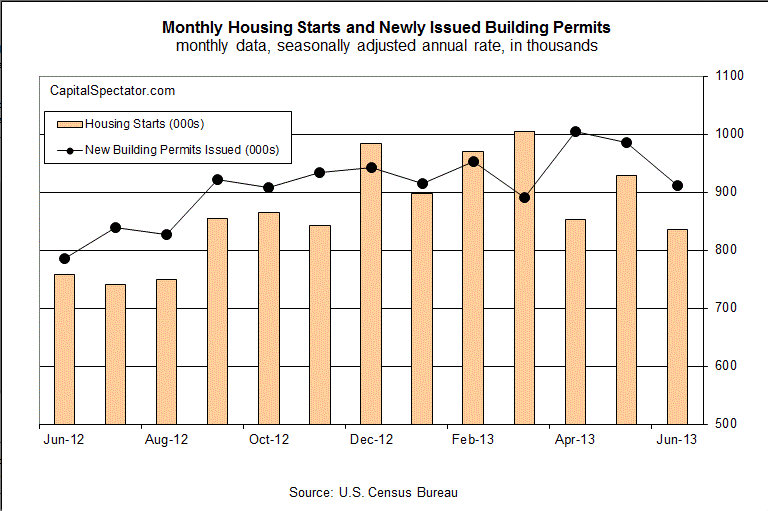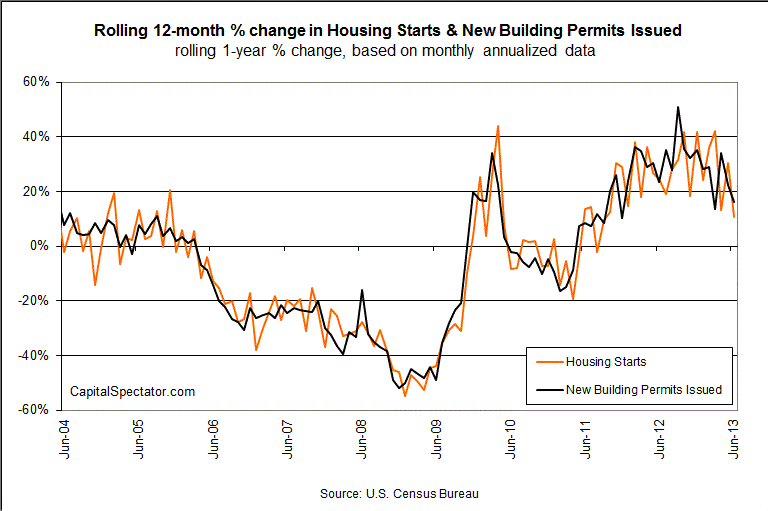Residential construction in the US tumbled last month, according to the Census Bureau’s June report. Housing starts dropped a hefty 9.9% to a seasonally adjusted annual rate 836,000, the lowest since last August. The decline was substantially below expectations, and the red ink is compounded by the fact that newly issued building permits also retreated, retreating by 7.5% vs. May.
One theory for what happened is that wet weather in June played the spoiler and kept building activity low. A more ominous view is that higher interest rates are taking a toll. What's clear is that starts and permits have run into headwinds in recent months, and June was no exception.
The damage is also infecting the year-over-year comparisons. The annual pace for both starts and permits has fallen substantially this year. Indeed, the 10.4% gain in starts last month vs. the year-earlier level is the slowest rate of growth since 2011.
Is The Housing Recovery Over?
Maybe, but it’s still premature to say so with much confidence, even if today's data looks like a smoking gun. A more plausible scenario, at least for now, is that the rebound in housing is transitioning to a lower speed. As I’ve noted in the past, it’s always been naïve to expect that the 20%-to-40% year-over-year increases in the recent past would be sustainable. Those hefty increases reflected an extraordinary period that was a largely a byproduct after a lengthy correction that probably went on for too long.
Demographic-driven demand kept inching forward, even when the homebuilding industry went into hibernation after the housing crash of 2006-2009. There was a false start in 2010 to deliver more supply, but it faltered. A year later, a second leg of the rebound commenced, leading to a relatively robust increase in building activity. In December 2011, I wondered if the housing recovery was the real deal. As it turned out, it was, and probably still is. But the low-hanging fruit has been picked. Granted, there’s a bit more risk these days for projecting that the housing recovery will roll on. On that note, the next round of monthly updates may be critical for deciding if we’re downshifting to a lesser rate of growth vs. moving into a period that’s considerably darker for housing.
Slow Growth
For now, I’m inclined to favor the lower-pace-of-growth scenario. Why? One encouraging trend is the labor market, which is still growing moderately, as it has been for some time. In fact, a broad set of economic and financial indicators continue to trend positive with regards to estimating the business cycle for the US. Meanwhile, confidence in the home building industry continues to rise, with the NAHV/Wells Fargo Housing Market Index (HMI) for July posting its third consecutive monthly gain and its highest reading since January of 2006. And despite the recent pop in interest rates, mortgage rates remain close to historic lows. The national average for the conventional 30-year fixed mortgage last week was around 4.5%. That’s roughly a two-year high, but otherwise we’re still at levels unseen in decades. The price of financing the purchase of a house, in other words, is still inexpensive by historical standards.
The risk, of course, is that interest rates rise too much, too fast from here on out. A sudden turn for the worse in payrolls would be disturbing as well. Suffice to say, there are many things could wrong for housing and we shouldn’t be blind to those possibilities. But stepping back and considering the broad macro picture as currently known still leaves plenty of room for anticipating that moderate growth is still the likely scenario for the near term.
Yes, that big-picture trend can and will change. In fact, it’s always in flux, and it's possible we're at a critical juncture in the here and now. But the bigger danger is confusing noise with a change in the overall trend. How will you know the difference? Let’s just say that a higher level of clarity requires more than a few weak months in the housing data.
- English (UK)
- English (India)
- English (Canada)
- English (Australia)
- English (South Africa)
- English (Philippines)
- English (Nigeria)
- Deutsch
- Español (España)
- Español (México)
- Français
- Italiano
- Nederlands
- Português (Portugal)
- Polski
- Português (Brasil)
- Русский
- Türkçe
- العربية
- Ελληνικά
- Svenska
- Suomi
- עברית
- 日本語
- 한국어
- 简体中文
- 繁體中文
- Bahasa Indonesia
- Bahasa Melayu
- ไทย
- Tiếng Việt
- हिंदी
June Was A Rough Month For Housing Construction
Published 07/17/2013, 10:57 AM
Updated 07/09/2023, 06:31 AM
June Was A Rough Month For Housing Construction
3rd party Ad. Not an offer or recommendation by Investing.com. See disclosure here or
remove ads
.
Latest comments
Install Our App
Risk Disclosure: Trading in financial instruments and/or cryptocurrencies involves high risks including the risk of losing some, or all, of your investment amount, and may not be suitable for all investors. Prices of cryptocurrencies are extremely volatile and may be affected by external factors such as financial, regulatory or political events. Trading on margin increases the financial risks.
Before deciding to trade in financial instrument or cryptocurrencies you should be fully informed of the risks and costs associated with trading the financial markets, carefully consider your investment objectives, level of experience, and risk appetite, and seek professional advice where needed.
Fusion Media would like to remind you that the data contained in this website is not necessarily real-time nor accurate. The data and prices on the website are not necessarily provided by any market or exchange, but may be provided by market makers, and so prices may not be accurate and may differ from the actual price at any given market, meaning prices are indicative and not appropriate for trading purposes. Fusion Media and any provider of the data contained in this website will not accept liability for any loss or damage as a result of your trading, or your reliance on the information contained within this website.
It is prohibited to use, store, reproduce, display, modify, transmit or distribute the data contained in this website without the explicit prior written permission of Fusion Media and/or the data provider. All intellectual property rights are reserved by the providers and/or the exchange providing the data contained in this website.
Fusion Media may be compensated by the advertisers that appear on the website, based on your interaction with the advertisements or advertisers.
Before deciding to trade in financial instrument or cryptocurrencies you should be fully informed of the risks and costs associated with trading the financial markets, carefully consider your investment objectives, level of experience, and risk appetite, and seek professional advice where needed.
Fusion Media would like to remind you that the data contained in this website is not necessarily real-time nor accurate. The data and prices on the website are not necessarily provided by any market or exchange, but may be provided by market makers, and so prices may not be accurate and may differ from the actual price at any given market, meaning prices are indicative and not appropriate for trading purposes. Fusion Media and any provider of the data contained in this website will not accept liability for any loss or damage as a result of your trading, or your reliance on the information contained within this website.
It is prohibited to use, store, reproduce, display, modify, transmit or distribute the data contained in this website without the explicit prior written permission of Fusion Media and/or the data provider. All intellectual property rights are reserved by the providers and/or the exchange providing the data contained in this website.
Fusion Media may be compensated by the advertisers that appear on the website, based on your interaction with the advertisements or advertisers.
© 2007-2024 - Fusion Media Limited. All Rights Reserved.
